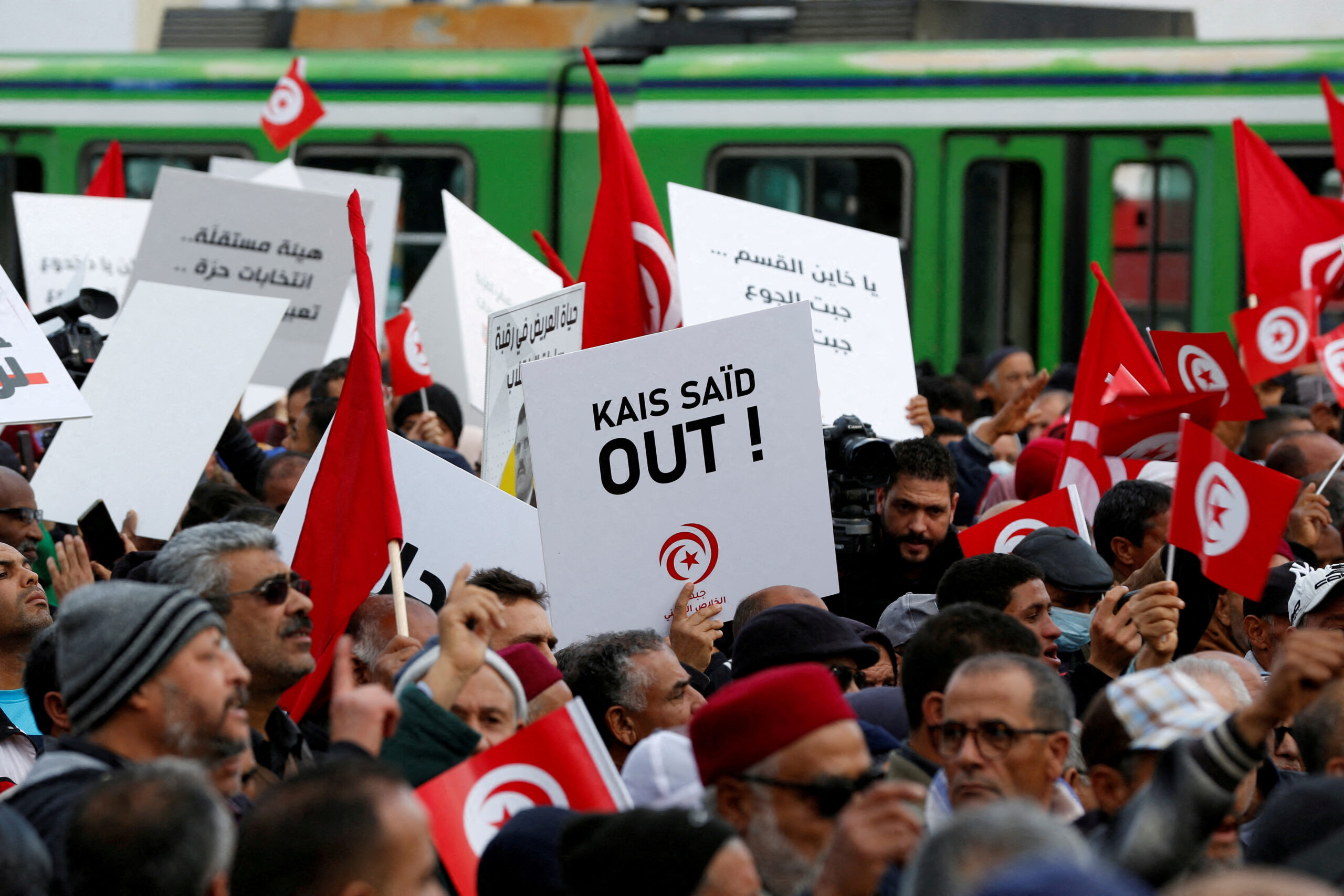Often heralded as the leading democracy in the Arab world for its enshrined progressive constitution and political pluralism, the Republic of Tunisia has recently experienced a concerning political shift. Tunisian political activists, journalists, and social networks’ users are witnessing an unprecedented governmental crackdown on freedom of expression, bolstered by a historical constitutional amendment.
The ‘Post-July 25th’ political practice
Less than two years into a presidential mandate marked by parliamentary fragmentation and escalating political frustration, president Kaïs Saïed froze the Tunisian parliament on July 25th, 2021. Political analysts have since referred to Saïed’s subsequent decisions as the “post-July 25th track”.
Saïed eventually dissolved the frozen parliament and announced a set of unilateral political reforms revolving around a referendum-implemented constitutional amendment in 2022. While the president initially assembled a constitutional reform committee, members of the committee later claimed they had little to do with the referendum’s proposed constitutional text.
Despite highly ambiguous drafting circumstances, Saïed’s reforms received popular support; his constitutional referendum passed with a 94% majority, reports the High Independent Authority for Elections (ISIE). But how could such a contested unilateral political project gain unanimity in Tunisia?
Constitutional law professor Salwa Hamrouni explains that the 2022 constitution formally arose from a conjuncture of political instability as a response to the failures of the political system brought forth by the misimplemented 2014 constitution. The government constructed a public narrative that a constitutional amendment became necessary because of the pressing socioeconomic challenges and the absence of a parliamentary majority.
According to the 2014 constitution, it falls upon the majority party to form the government and lead parliamentary projects. Yet, political alliances fragmented the parliament and drowned governmental accountability in ambiguity. Thus, when Saïed set out to allegedly defragment political power and implement sought-after political change, he rose in popularity.
Soon after, this political defragmentation project escalated into a power consolidation. The president currently controls the executive, legislative, and judicial branches with no formal system of checks and balances in place. The amended constitution annulled the Independent High Authorities for Audiovisual Communication (HAICA) and Anticorruption (INLUCC), which acted as watchdogs, mobilizing public opinion against media abuse and corruption.
After implementing the new constitution, Saïed’s power consolidation devolved into targeted political arrests of prominent journalists, activists, and syndicate members who vocalized their criticisms of the post-July 25th track.
The unwelcome return of the Police State
July 20th, 2022, marked a significant day for Tunisian opposition activists, who gathered five days before the referendum, facing the Ministry of Interior to peacefully express their concerns surrounding the unilateral drafting of constitutional amendments. However, to their dismay, police forces instigated violence against the peaceful demonstrators, assaulting the head of the journalists’ syndicate. Political activist Asrar Ben Jouira, present during the protest, witnessed the brutality firsthand.
“Despite the fragmented and contentious political scene, the 2014 constitution created a participatory environment allowing civil society activists the freedom of dissent. The 2022 amendments ruptured that convention,” said Jouira explaining her reservations.
A few months following the referendum, several political activists who were present at the July 20th protest received vaguely-stated arrest warrants. It was only when political activist Wael Nawwar presented himself to the authorities for an investigation that he discovered that himself, Asrar Jouira, and six other activists were legally pursued. Rather than issuing the warrants, the police kept a record of charges against the protestors.
Jouira believes the police weaponized arrest warrants based on unfounded allegations to sitffle political activists. Public police records showed that four policewomen pressed verbal and physical abuse charges against Jouira. The latter claimed she hadn’t even seen any women among the deployed police forces on that day. Several anonymous activists identified at the July 20th protest corroborated her claims.
The government crackdown also targeted prominent journalists, of which private radio station Mosaique FM director Noureddine Boutar. Boutar was arrested in February 2023 under an alleged abuse of power investigation then released a month later. Lawyer Ayoub Al-Ghadamsi claimed the investigating judge issued the decision based on the “use of the liberal line of Mosaique FM to insult the power hierarchy and state symbols and inflame the situation in the country.” Ayoub described the arrest as a targeted and ‘vindictive’ attack against the station director who is notorious for his scathing criticisms of the current regime.
Most recently, two students who uploaded a satirical video online faced charges based on various articles of the Penal Code, the Telecommunications Code, and Decree-Law No. 2022-54. On the 15th of May 2023, the students were apprehended and placed under police custody. They were detained under an arrest warrant issued by the Nabeul Court of First Instance the following day. The students were later acquitted during their hearing on May 23rd. This, however, creates a dangerous infringement precedent against internet users.
With the ticking clock of an impending economic collapse, the rising political tension in Tunisia meets the bleak reality of neo-fascist political practice. Activists, journalists, and internauts grasp for air as the room for freedom of speech shrinks. The nation’s once-promisng democracy remains in question of desired course correction.


